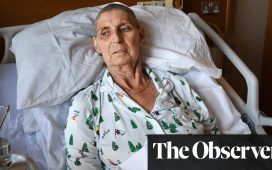I found Ella Creamer’s article (My mum’s death was slow and painful – she deserved the choice to end her life, 6 April) about needing to have a choice in how our life ends incredibly moving, largely because it so closely mirrored my experience with both my mother, who died in 2010 when I was 19, and my grandmother, who died 10 years later. Both died of cancer.
My mother spent two months in hospital, slipping in and out of consciousness and psychotic episodes while the radiotherapy that was supposed to help her made her brain swell, followed by over a year of partial blindness and constant pain. What struck me was not only that she was unable to choose to end her life with dignity, but that the medical teams fought to prolong it for as long as possible, even when her suffering was extreme. I kept thinking, aged 18, if she were a dog we’d be humane and ease her passing; why do we afford less to humans?
The same then happened to my grandmother. She underwent aggressive treatment that she was too frail to withstand and which had no hope of curing her, rendering her unable to digest food and in constant pain. I have the utmost respect for the doctors who treated both of them, but I feel that as a society we blindly prioritise length of life over quality.
My genes dictate that I will almost certainly get cancer and undergo the same aggressive treatments. I only hope that by the time that happens I’ll be able to choose how I die, just as I’ve been able to choose how I live.
Katy Moyle
London
Too few people understand the trauma of a slow and painful end of a terminal illness. It doesn’t help that many such deaths are described as “dying peacefully in their sleep”.
In reality, the family will endure days or weeks of being behind the curve on pain relief as a doctor is sought to increase the morphine dose, along with the awful feeling of watching someone you love die uncomfortably from or with thirst. Six years after my own mother’s death in very similar circumstances to Ella Creamer’s, I am still traumatised.
If as a society we accept the slow demise from increasingly fatal levels of morphine, or the inevitable withdrawal of sustenance, why on earth can’t we accept giving such patients a choice to end it all sooner?
I do not know if I would have the courage to end my life via such assistance, but I am now firmly of the view such a choice is right, ethical and humane.
Name and address supplied
Ella Creamer’s distress and anger are justified. Her mum did not deserve poor care, communication or coordination. The question is whether inadequate health and social care is a reason for legalising assisted dying.
Much of her mum’s care was inexcusable: the inability to identify distress in someone with communication difficulties (despite tools existing to identify such distress); incorrect prognosis (her mum lived seven months beyond an estimate of a few weeks); insufficient staffing (a worsening issue in health and social care); ignorance of feeding needs at the end of life (still widely misunderstood); lack of access to specialist palliative care (an issue for 120,000 UK people per year); and scant or inadequate communication with the family (a duty of care).
Assisted dying is cheap: one assisted death in Canada costs the same as two weeks of UK nursing home care. In a society unwilling to fund social and health care adequately, including specialist palliative care – which depends on charitable funding to survive, assisted dying is an attractive option to health economists and politicians. This economic influence on the desire for an assisted death is attested to by the increasing evidence of abuse, especially in Canada. Poor care must never be the driver for an assisted death.
Claud Regnard Honorary consultant in palliative care medicine, St Oswald’s hospice, Newcastle upon Tyne; Prof Rob George Professor of palliative care, King’s College London; Amy Proffitt Past president, Association for Palliative Medicine, UK
READ SOURCE












